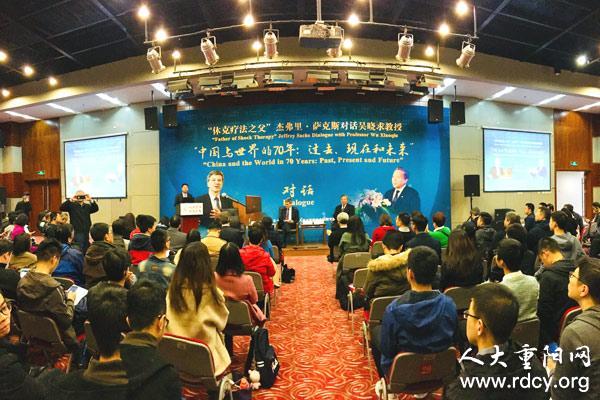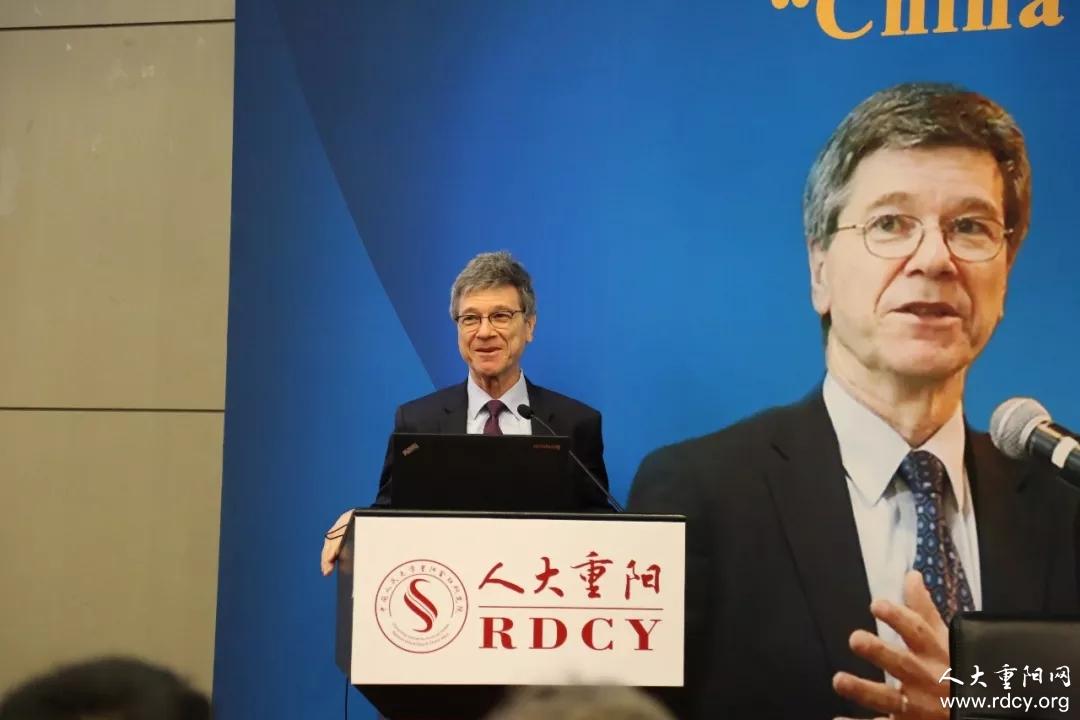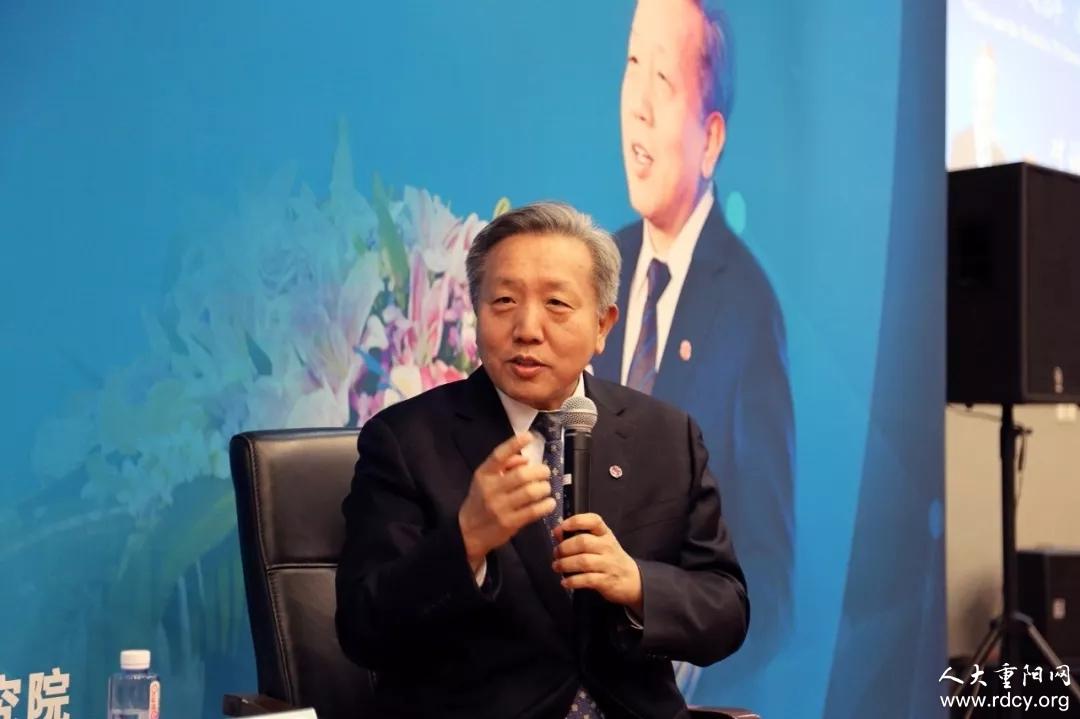Picture
Your Present Location: HOME> Picture“Father of Shock Therapy”: China should not blindly copy the US model
On the morning of March 24, organized by Chongyang Institute for Financial Studies of Renmin University of China (RDCY), the 39th Chongyang Forum was held in Beijing, inviting Jeffrey Sachs, reputed as “Father of Shock Therapy”, to have a dialogue with Professor Wu Xiaoqiu, Vice President of Renmin University of China, with the theme "70 years of China and World: Past, Present and Future". The dialogue was moderated by Wang Wen, executive dean of the RDCY.

Professor Jeffrey Sachs addressed that both China and America are facing problems including income inequality, unbalanced economic development and sustainable progress. However, he warned that China should not blindly copy the US model. Undoubtedly, China is not willing to accept problems brought by the US model because even America itself needs a major shift.
Sachs thought that both China and America need a brand-new and sustainable model of economic development. There is no precedent in history or textbook so people should identify a new path. He said that this brand-new and sustainable model of economic development should be powered by market economy without the role of government. In a nutshell, we need a mixed economic model with engagement of the government and market. He applauded advantages of China in this field and also pointed out that a major shift can empower the government and market to play their roles.

Moreover, the sustainable economic model asks for restructuring and transformation in six fields:
The first point deserving our attention is energy structural transformation. Professor Sachs held the view that energy structural transformation may be the most important and urgent one as well as a severe challenge facing all countries. China is confronted with two major environmental crises including climate change and heavy pollution in air, water, ocean and soil. America also depends largely on fossil fuels and its emission of carbon dioxide is almost twice as high as per capita in China. Therefore, both two nations need a major structural shift in economy to realize true energy transformation.
To overcome dual environmental challenges, Sachs put forward the idea that the most significant step is to translate energy transformation into reality, replace fossil fuels like coal and natural gas with more new energy such as water conservation, nuclear, solar, wind and other primary energy that pose no pollution to environment. We should notice two questions: How can we realize this or whether the transformation can occur in time?
Sachs said: “The government and enterprise should work together to realize energy structural transformation and the government needs to take the initiative to set framework for energy transformation in the current stage. Meanwhile, private enterprises must provide solar and wind energy through innovation as a basic solution, public and private departments should fulfill their due obligations.” He emphasized the importance of a long-term plan for realizing such sustainable economic model.
“Although China is formulating its 14th five-year plan, the period of five years is too short. As the whole energy transformation will concern a long-term plan for about 20 or 30 years in the future, only in this way can China achieve real success.” “There is no fully-fledged plan at national level in America. Americans need to adjust their mindset, and it is necessary to remind them to make pioneering plan in order to realize sustainable development. “In the aspect of mechanism, we need to take into consideration which kind of mechanism framework can truly lead to restructuring and transformation.”
The second point that Sachs highlighted is the transformation of land use. Aside from energy structural transformation, Sachs also hailed the transformation of land use. Most countries don’t own sustainable strategy of land use for the moment at least. We need to conserve water, land, soil, forest and biological diversity. China is making such strategy. The degree of pollution is relatively high worldwide, which means a major challenge for transformation.
Then education should be transformed. He thought high-quality education can not only boost economic development but also contribute the resolution offered by technology in the future. China boasts a solid bedrock for educational system, prestigious universities and extremely experienced research fellows, which enable China to enjoy the fastest pace in education on a par with America.
The fourth point is to transform the field of medical treatment and health for all. “We believe it is necessary to maintain good national medical and sanitary situation especially in the ageing society. Ageing people need more supports and services in medical treatment. Both China and America are facing this problem which is not easy to be fixed.” He also warned that China should not learn the US diet structure because forty percent of adults in America are obese.
The fifth point is the sustainable transformation of urbanization. “Many cities have witnessed rapid development which also led to car-clogged and non-green living problems in past four decades. They lack enough parks and it is very difficult to walk. I have to say there exist many potential problems in their progress.”
The last point is the digital transformation of Internet. Digital society represents one of the most important fields of sustainable model of economic development. “As one of the countries that use Internet most widely, China leads the spread of mobile payment in the world.” Sachs also considered that digital economy has brought huge impacts on our lives as digital system we develop can provide better services. In the meantime, privacy protection also needs for great caution.
“We have adequate technology and capacity to eradicate poverty, and secure resources of medical care, education and renewable energy for all. However, two nations don’t realize these targets. We need more plans and directions, as well as market participants.
Sachs thought that American political system is dominated by the wealthy who own a stronger desire for money than sustainable development, which means a huge political challenge. From his point of view, trump administration may be the worst one in American history as the president only cares for interests of powerful men including pollution manufacturer and wealthy men. “A general election is due next year. I hope that people can see rational American government, he added.

In response to Professor Sachs, Professor Wu Xiaoqi said that both China and America are facing several challenges. First and foremost, we need pay attention to equality. With the development and prosperity of economy in China, the problem of equality increasingly come to our sights. When it comes to Gini coefficient, the data of China is close to that of America. In this connection, unfair wealth distribution deserves our attention as inequality can undermine the bedrock for stable society and make the gap between the wealthy and the poor bigger and bigger.
Environmental problem is the second point. Undoubtedly, China’s progress is at the expense of environment. China’s energy system is dominated by fossil fuels like coal, which can impose direct pollution on environment. In the past four decades, we have scored brilliant achievements in economy but we ignore the protection of environment. Now we should spare no efforts to tackle the problem and restore the ecological environment. As the sole super power in the world, the US are facing the same challenge, however, it can’t compare with that of China.
Innovation holds key to the prosperity of China. The future of a nation hinges on the development of technology. In the past four decades, China’s high education has trained many engineers and other talents, injecting fresh blood into our industrialization. In addition, China has also nurtured many economist experts with global vision who have made meticulous design for China’s economic reform. That is why people attach importance to high technology and innovation. What’s more, innovation derives from high education. Therefore, we need to highlight the importance of education.
The project of health for all is also significant. We should pay particular attention to food safety.
He noted that past 40 years have seen tremendous achievements in China’s economy. According to PPP, China is the largest country in the world. We can find that there is still much potential of consumption to be tapped in China, which means a merit for our progress. We like learning from the western world especially America, because the western civilization has its unique advantages. We Chinese are reputed as the most industrious ethnic group worldwide, and we are also willing to draw on others’ merits.
Building on friendly economic exchanges, America should keep political contact with China instead of regarding China as a rivalry or even an enemy. China is a peace-loving country and aims to lift all people out of poverty. He emphasized that China is willing to cooperate with America in economic and political fields. Any attempt that worships zero-sum game and winner-takes-all is doomed to failure. China’s enterprise will compete with foreign counterparts with much more confidence as China deepens its reform and opening-up. In addition, China will vigorously facilitate its financial openness and promote RMB’s role in global currency system, Professor Wu said.
At the subsequent session, Professor Wang Wen conducted in-depth discussions with these two well-known scholars on the technological development and future of human beings. Professor Sachs and Professor Wu Xiaoqiu also respond to the questions from the audience on the topics such as Sino-US trade friction, Indo-Pacific Strategy and middle-income trap.























































































 京公网安备 11010802037854号
京公网安备 11010802037854号





